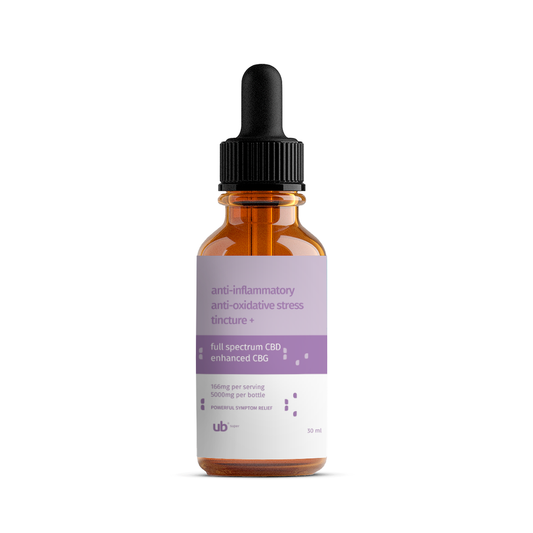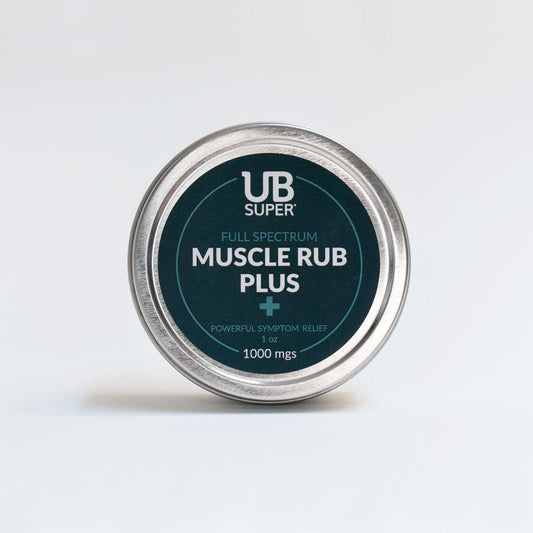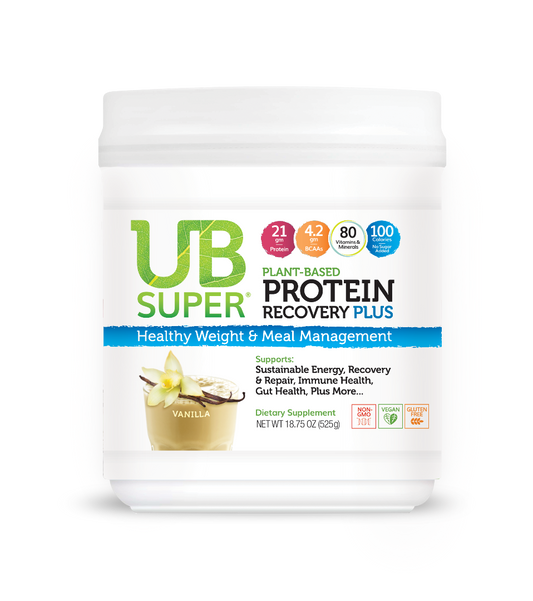Ingredients Shake Detailed
UB SUPER PROTEIN SUPERFOOD NUTRITIONAL SHAKE INGREDIENTS
Click through the list below to see the ingredients in our protein superfood nutritional shakes.
- PROTEINS
- BROAD SPECTRUM HEMP EXTRACT
- FULL SPECTRUM HEMP EXTRACT
- FLOWER POLLEN EXTRACT
- SUPERFOODS
- VITAMINS
- FULVIC ACID/MINERALS
- DIGESTIVE ENZYMES
- PREBIOTICS & PROBIOTICS
- AMINO ACIDS
- HYALURONIC ACID
- GLOSSARY
- LEGAL
PROTEINS
Proteins are large molecules made up of 20 standard amino acids. The human body can produce 11 amino acids, with the remaining nine coming from the diet.
Proteins are the foundational building blocks of cells and tissues, including bones, muscles, cartilage, skin, and blood. They are responsible for kick-starting your metabolism and contribute to the creation of enzymes, hormones, and vitamins. Lean proteins—those low in saturated fat and cholesterol—provide the calories necessary to fuel an active lifestyle.
UB Super contains the highest quality proteins to promote muscle growth and repair.
UB Super Plant-Based Protein Superfood Nutritional Shake:
Yellow Pea
Yellow peas are an excellent source of dietary fiber and protein. They are rich in the amino acid tryptophan, which necessary for manufacturing serotonin, another amino acid that improves mood and regulates appetite, hunger, and sleep. Yellow peas are also high in vitamin B1 and B9, phosphorus, potassium, molybdenum, and manganese.
The benefits of yellow pea include:
- Promotes healthy blood sugar
- Cardiovascular health
- Supports optimal cholesterol levels
- Digestive regularity
- Metabolic health
- Healthy weight
Chia Seed
Known botanically as Salvia hispanica, chia is a flowering plant closely related to the mint family. Native to central and southern Mexico, South America and Central America, chia is an ancient grain that was once a favorite “power food” of the ancient Aztecs, who believed it gave them mystical energy and stamina. Documents dating as far back as 3,500 BC shows that the Aztecs used the grain as their nutritional foundation.
Chia is packed with essential fatty acids and high-quality fiber, as well as antioxidants (namely bioflavonoids) and critical minerals like magnesium, calcium, manganese, phosphorus, and iron. On the fatty acids front, chia consist of 25-30 percent oil, which is comprised of 55 percent omega-3s (primarily alpha-linolenic acid), 18 percent omega-6, six percent omega-9 and just 10 percent saturated fat. Additionally, the ALA found in chia has been shown to be superior to that found in flax.
The Salba© brand of chia seeds is the only registered variety of Salvia hispanica L. Every crop of Salba can be traced back to its seeds and is grown under strictly controlled conditions to prevent cross-hybridization and degradation of the variety. Most importantly, Salba is the only variety of Salvia hispanica that has undergone intensive, peer-reviewed, human clinical research. Daily consumption of Salba has been shown to generate significant improvement in control of type-2 diabetes and reduction of risk for heart disease.
The benefits of Salba© chia seed include:
- Anti-inflammatory
- Bone health
- Healthy cholesterol levels
- Digestive health
- Skin health
Hemp Seed
Hemp seed provides sustainable energy through an abundance of easily digested plant protein. It contains vitamins B1 and B2, vitamin C, vitamin E, beta-carotene, calcium, magnesium, phosphorus, and potassium. Additionally, hemp seed is an excellent source of omega fatty acids, fiber, antioxidants, and minerals.
The benefits of hemp seed include:
- Anti-inflammatory
- Bone health
- Cardiovascular health
- Digestive health
- Mental clarity
- Skin and hair support
Flaxseed
Often referred to as “the most powerful plant food in the world,” flaxseed contains a wide range of nutrients, most notably including B1 (thiamine), B6, iron, magnesium, phosphorus, and zinc. It is also a good source of B2 (riboflavin), niacin, pantothenic acid (B5), calcium, and potassium.
Flax is also an incredible source of soluble fiber, and is one of the few plant foods that are considered a complete protein, meaning it contains all nine essential amino acids. Just one tablespoon of flaxseed contains 2-3 grams of protein!
Flaxseed gets it powerhouse health benefits from its rich stores of essential fatty acids and lignans. Flax is one of the best sources of vegan omega-3 fatty acids, specifically alpha-linolenic acid (ALA). When it comes to lignans—plant compounds known to have both antioxidant and mildly estrogenic properties—flax contains anywhere from 75 to 800 times more lignans than other plant foods on the planet.
The benefits of flaxseed include:
- Blood sugar
- Breast cancer protection
- Cardiovascular health
- Digestive health
- Hormone balance
- Joint health
- Skin and hair health
- Weight maintenance
BROAD SPECTRUM HEMP EXTRACT
A unique broad-spectrum, water-soluble, nano-particulate, THC-free hemp extract from Nutritional Hemp. Oils have low solubility, poor absorption and low oral bioavailibility. Through nano-technology and submicroscopic aggregation of molecules, our proprietary element increases solubility, and stability of actives, while also increasing bioavailibility and cost effectiveness of each dose.* This fusion of valuable phytocannabinoids and terpenes, including CBD—while excluding THC—may support healthy endocannabinoid function.*
FULL SPECTRUM HEMP EXTRACT
A unique broad-spectrum Hemp Extract from Nutritional Hemp with terpenes from Black Pepper Fruit and Clove Oil, which forms our proprietary Whole Food Hemp Complex. This fusion of unique plant extracts includes valuable phytocannabinoids and terpenes naturally occurring in Nutritional Hemp and other botanicals such as Black Pepper Fruit and Clove Oil.* These unique all-natural compounds may support healthy Endocannabinoid System function.*
FLOWER POLLEN EXTRACT
Graminex G60 Flower Pollen Extract is a concentrated form of water-soluble pollen extract, which contains plant-based amino acids and water-soluble vitamins. The amino acids support cell regeneration, while the natural antioxidants found in the vitamins provide protection from free radical damage. This element is Non-Allergenic.
SUPERFOODS
A superfood is a nutrient-dense food that promotes health and well being. Superfoods tend to be higher in antioxidants, fiber, vitamins, and minerals than your average grocery store fruits and vegetables. That’s why UB Super superfoods are globally sourced from the lushest environments around the world.
One of the greatest benefits of superfoods lay in their antioxidant benefits. Antioxidants are phytonutrients that significantly decreases the adverse effects of oxidation, a process of physical wear and tear accelerated by stress, pollution, smoking, and alcohol. Oxidation can lead to free radical damage, which has been linked to inflammation and poor health in general. Antioxidants work to prevent free radical damage, support the immune system, and promote overall health.
The superfoods found in UB Super include:
Açaí
Açaí | Euterpe oleracea
Origin: Amazon River Basin
Açaí is a rich source of antioxidants celebrated for boosting the immune system, supporting healthy cholesterol, and helping to maintain healthy body weight. Traditionally, açaí has been used to promote digestive regularity and support healthy circulation. Açaí is thought to contain 10x more antioxidants than red grapes.
Acerola Cherry
Acerola | Malpighia emarginata
Origin: Amazon Rain Forest
Acerola cherry is extremely rich in vitamin C, and is a good source of vitamins A, B1, B2, and B3, as well as carotenoids and bioflavonoids. Acerola supports optimal heart health form collagen for the development of new and healthy skin cells.
Cacao
Cacao | Theobroma cacao
Origin: Central and South America
Cacao is high in copper, manganese, zinc, and vitamin B5, and antioxidants called flavonoids thought to support healthy cell growth, improved blood flow, and overall heart and brain health.
Camu Camu
Camu Camu | Myrciaria dubia
Origin: Amazon Rain Forest
Two to three percent of camu camu weight is comprised of vitamin C. In fact, it contains 50x the amount of vitamin C found in oranges. Camu camu provides invaluable support to the immune system, eases inflammation, supports eye and brain health, and protects liver function.
Cupuaçu
Cupuaçu | Theobroma grandiflorum
Origin: Amazon River Basin
Related to cacao, cupuaçu is praised for enhancing mood and energy levels, supporting healthy blood pressure, and maintaining immune and gastrointestinal health. Cupuaçu contains very little caffeine, energizing the body instead of with sustainable stimulants theobromine and theophylline.
Mangosteen
Mangosteen | Garcinia mangostana
Origin: Southeast Asia
Mangosteen is rich in vitamin C, as well as potassium and vitamins B3, B9, and B12. Most importantly, mangosteen contains the greatest known supply of xanthones, yellow pigments that have been shown to be powerful antioxidants. Thanks to xanthones and their antioxidant status, mangosteen helps to repair the cell membranes by supporting heart health, boosting immunity, and reducing oxidation and free radical production.
Maqui Berry
Maqui berry | Aristotelia chilensis
Origin: Chile and Argentina
The maqui berry is found in the southern part of the Andes Mountains, as well as the Patagonian mountains of southern Chile. Nutritionally, maqui berries are rich in antioxidants, particularly polyphenols and anthocyanins. In fact, they contain the highest concentration of phenols of any other berry, as well as the highest ORAC value of any fruit worldwide. Maqui also contains vitamins A, C, and E, as well as calcium, potassium, and iron.
Noni
Noni | Morinda citrifolia
Origin: Southeast Asia
Related to coffee, noni provides antioxidant support and strengthens the immune and digestive systems. Noni pulp powder preserves the fruit's rich vitamin C, vitamin B3, iron, and potassium far better than juice.
Pomegranate
Pomegranate | Punica granatum
Origin: Mediterranean
High in antioxidants (especially polyphenols) and ellagic acid, pomegranates have been found to help fight free radicals. Specifically, research indicates that pomegranates may play a role in supporting immunity and heart health.
|
UB Super Superfoods |
Antioxidants |
Benefits |
|
Açaí |
Carotenoid (beta-carotene) and polyphenol (anthocyanins and flavonoids) |
Eye health; immunity; cardiovascular health |
|
Acerola cherry |
Carotenoids and polyphenols (bioflavonoids and anthocyanins) |
Eye health; immunity; cardiovascular health |
|
Amla |
Polyphenols (flavonoids and ellagic acid) |
Immunity and cardiovascular health |
|
Annatto |
Carotenoid |
Eye and cardiovascular health |
|
Cacao |
Polyphenols (anthocyanins and flavonoids) |
Immunity and brain and cardiovascular health |
|
Camu camu |
Polyphenols (anthocyanins and flavonoid) |
Immunity and brain and cardiovascular health |
|
Cupuaçu |
Polyphenols (flavonoids and theograndins); tannins |
Immunity and cardiovascular health; antiviral, antibacterial, antiparasitic properties |
|
Guava |
Carotenoids (lycopene) |
Eye and cardiovascular health |
|
Mangosteen |
Xanthones |
Immune, digestion, and cardiovascular health |
|
Maqui berry |
Polyphenols (anthocyanins) |
Immunity and cardiovascular health |
|
Noni |
Carotenoids (beta-carotene) and polyphenols (anthocyanins) |
Eye health; immunity; cardiovascular health |
|
Pomegranate |
Polyphenols and ellagic acid |
Immunity; heart health |
VITAMIN A
Vitamin A is critical for eye health and for the support of cell growth and maintenance in the heart, lungs, kidneys, and other organs. Vitamin A also helps to form and maintain tissues such as skin, teeth, mucous membranes, and soft tissues. A lack of vitamin A can lead to skin conditions and eye damage.
UB Super sources vitamin A (as beta-carotene) from certified organic annatto seed extract. The human body converts antioxidant beta-carotene into vitamin A.
VITAMIN B-COMPLEX
B vitamins are essential to the process of converting food into fuel, generating energy to power an active lifestyle. The benefits of the B-vitamin family range from maintaining memory to the production of red blood cells and supporting healthy blood sugar levels.
UB Super derives a B-vitamin complex from certified organic guava, mango, and lemon extracts, which includes vitamin B1 (thiamin), B2 (riboflavin), B3 (niacin), B5 (Pantothenic Acid), B6 (pyridoxine), and B9 (folate). UB Super derives vitamin B7 (biotin) from agati and vitamin B12 in the form of methylcobalamin.
VITAMIN C
Vitamin C supports tissue growth and repair throughout the body. Vitamin C improves iron absorption and helps the body heal wounds. Vitamin C contains antioxidants that fight free radicals, support healthy blood pressure levels and maintain optimum heart health. Because your body does not store vitamin C, consuming an adequate amount of this critical vitamin is incredibly important.
UB Super sources vitamin C from certified organic amla fruit extract, acerola, camu camu, and açaí.
VITAMIN D3
Vitamin D3 has several important functions, including regulating the absorption of calcium and phosphorous and facilitating normal immune system function. Getting a sufficient amount of vitamin D3 is important for normal growth and development of bones and teeth, as well as immune health.
UB Super sources vitamin D3 as cholecalciferol from lichen. It is the only vegan source of vitamin D3 available.
VITAMIN E
Vitamin E is a powerful antioxidant that is not one, but eight compounds—four tocopherols (alpha, beta, delta, and gamma) and four tocotrienols (alpha, beta, delta and gamma).
Vitamin E works to prevent cell damage throughout the body. It also strengthens the immune system and its response to an attack and has antihistamine properties that can help people suffering from allergies. Vitamin E also provides diabetes-specific nerve protection and reduces free radical oxidative stress in people with diabetes.
UB Super sources organic vitamin E from annatto.
VITAMIN K2
Vitamin K is a fat-soluble vitamin that is produced by bacteria in the intestines. There are two natural forms of vitamin K—K1 and K2. Vitamin K2 is the form most commonly found in animals and has several subtypes known as menaquinones.
There are at least 11 different subtypes of menaquinones, but the most commonly studied are menaquinone-4 and menaquinone-7. Menaquinone-4 can be synthesized from vitamin K1 in certain animal tissues (namely the arterial walls, testes, and pancreas), while menaquinone-7 is synthesized from vitamin K1 by bacteria produced in the colon and is highly believed to be the most bioavailable and longest lasting form of Vitamin K.
UB Super sources menaquinone-7 from MenaQ7®, the only clinically supported, patented vitamin K2 on the market. Menaquinone-7 is the most bioavailable vitamin K around, and the MenaQ7® form is suitable for vegans and vegetarians, free from gluten, dairy, soy, and other known allergens.
FULVIC ACID/MINERALS
Aggressive farming, erosion, and chemicals have depleted the microorganisms and minerals in soil, which are necessary for optimal nutrient absorption. UB Super provides fulvic acid and minerals to supplement the deficiencies in a modern diet.
FULVIC ACID
Fulvic acid is one of the main components of humus—the dark, nutrient-rich organic soil layer. It is considered organic because it is comprised on partially decomposed plant and animal matter. Because of environmental damage, fulvic acid is no longer present in the foods we eat.
Fulvic acid contains more than 77 macro and trace minerals, most of which occur in their ionic form. This means that they are masters at conducting electricity and aiding in absorption. That means fulvic acid is capable of transporting energy between cells and can receive or donate electrons, prevent free radical damage, and increase the bioavailability of nutrients, namely minerals.
MINERALS
At one point in time, plants were able to effectively draw minerals from the soil and make them available for human consumption. Due to changes in the environment, our food sources are frequently deficient in minerals. Minerals are essential to the function of every chemical and electrical process in the body.
UB Super contains all the major dietary minerals, including calcium, magnesium, phosphorus, potassium, sodium, and sulfur. It also contains a number of trace minerals, including:
Aluminum
Antimony
Barium
Beryllium
Bismuth
Boron
Bromide
Carbon
Cerium
Carbonate
Cerium
Cesium
Chloride
Chromium
Cobalt
Copper
Dysprosium
Erbium
Europium
Fluoride
Gadolinium
Gallium
Germanium
Gold
Hafnium
Holmium
Indium
Iodine
Iridium
Iron
Lanthanum
Lithium
Lutetium
Manganese
Molybdenum
Neodymium
Nickel
Niobium
Osmium
Palladium
Platinum
Phosphorus
Praseodymium
Rhenium
Rhodium
Rubidium
Ruthenium
Samarium
Scandium
Selenium
Silicon
Silver
Strontium
Tantalum
Tellurium
Terbium
Thallium
Thorium
Thulium
Tin
Titanium
Tungsten
Vanadium
Ytterbium
Yttrium
Zinc
Zirconium
DIGESTIVE ENZYMES
Your body needs digestive enzymes to break down the food you eat into accessible nutrients to sustain your body. Without adequate enzyme availability, your digestion can be limited—leaving you with nagging discomfort (in the form of gas, bloating, and indigestion) and poor nutrition.
While all fresh fruits and vegetables contain some level of natural digestive enzymes, several are produced in the pancreas. UB Super contains six separate digestive enzymes, including:
-
Amylase—Digests starch (complex carbs) into glucose
-
Cellulase—Digests fiber
-
Phytase—Digests seeds and grains
-
Protease—Digests protein into free amino acids
-
Lactase—Digests lactose (milk sugar) into glucose and galactose
-
Lipase—Digests dietary fat
PREBIOTICS & PROBIOTICS
Prebiotics are fibers that feed good bacteria—probiotics—in the digestive tract. Prebiotics are proven to support gastrointestinal health by providing the fuel necessary to create probiotics. UB Super contains two prebiotics:
-
Inulin—improves calcium and magnesium absorption
-
Fructooligosaccharide (FOS)—improves mineral absorption and supports health cholesterol
Probiotics are microorganisms that help offer protection from harmful bacteria in the digestive tract. Together, prebiotics and probiotics can support a wide variety of digestive health concerns, as well as support immunity. UB Super contains four probiotics:
-
L. acidophilus—Maintain digestive and lung health
-
L. rhamnosus—Promote immunity and digestive health
-
B. bifidum—Maintain digestive and lung health
-
B. longum—Supports healthy pH in the intestines and digestive tract
AMINO ACIDS
Amino acids are organic compounds that combine to form proteins. Consuming a variety of amino acids throughout the day is vital for a balanced and healthy metabolism. There are three groups of amino acids: non-essential, essential, and conditional.
Non-Essential
Called “non-essential” simply because the human body can synthesize them, the non-essential amino acids are just as important as the other amino acids for creating protein. UB Super contains four non-essential amino acids:
-
Alanine
-
Asparagine
-
Aspartic acid
-
Glutamic acid
Essential
Called “essential” because the human body cannot synthesize them, these amino acids must be obtained from diet. UB Super contains nine essential amino acids:
-
Histidine
-
Isoleucine
-
Leucine
-
Lysine
-
Methionine
-
Phenylalanine
-
Threonine
-
Tryptophan
-
Valine
Conditional
“Conditional” amino acids are necessary when the body is experiencing stress or illness. UB Super contains eight conditional amino acids:
-
Arginine
-
Cysteine
-
Glutamine
-
Glycine
-
Ornithine
-
Proline
-
Serine
-
Tyrosine
COLLAGEN
Collagen is the main structural—and most abundant—protein in the body, making up 25 percent of all the protein found in your body. It helps form teeth and bones, while also supporting the elasticity of the skin and internal organs, including blood vessel walls. It also found in connective tissues, including tendons, cartilage, and ligaments.
UB Super sources collagen exclusively from grass-fed, pasture-raised cows, which are not given antibiotics nor growth hormones.
HYALURONIC ACID
Hyaluronic acid (HA) is a glycosaminoglycan (GAG) found throughout your body, primarily concentrated in the fluids of the eyes and joints as well as the skin. Proper levels of hyaluronic acid are essential for the maintenance and repair of connective tissue throughout the body, including collagen and cartilage.
Hyaluronic acid is typically sourced from rooster combs, soy, and/or corn, but the hyaluronic acid used in UB Super is sourced from potato.
NUTRIENT GLOSSARY
Amino acid – The basic structural unit that makes up a protein.
Anthocyanins – Part of the flavonoid family, anthocyanins are highly concentrated in the pigments of berries and cherries, giving them their bright vivid colors.
Antioxidant – A molecule that inhibits the oxidation of other molecules. Oxidation produces free radicals within our body that produce chain reactions of cell damage.
Bioflavonoids – Interchangeable term for flavonoids.
Collagen – The main structural—and most abundant—protein in the body, making up 25 percent of all the protein found in your body.
Carotenoids – These organic pigments in plants absorb light and come in more than 600 variations.
Casein – A protein found in milk that is responsible for many dairy allergies.
Electrolyte – A substance that promotes electrical flow within the body and is responsible for proper muscle and nerve function.
Essential fatty acids – A fatty acid that is required for biological processes, but cannot synthesize. A human body must ingest omega-3 and omega-6 essential fatty acids.
Fatty acids – Important sources of fuel that produce large levels of ATP (adenosine triphosphate), which transfers energy amongst cells and is preferred by heart and skeletal muscles.
Flavonoids – The most common type of polyphenolic compound; serves as an antioxidant.
Folate – A term that designates the natural form of folic acid (vitamin B9).
Folic acid – Also known as vitamin B9, it is needed by the body to synthesize DNA.
Free radical – Unstable molecules that produce cell damage. Known producers of free radicals are smoking, excessive alcohol consumption, radiation, contact with pesticide/herbicides, and other environmental factors.
Hyaluronic acid (HA) – A glycosaminoglycan (GAG) found throughout your body, primarily concentrated in the fluids of the eyes and joints as well as the skin.
Lipoprotein – “Bad” low-density lipoprotein (LDL) can contribute to plaque buildup, clot formation, and hardening of the arteries. “Good” high-density lipoprotein (HDL) removes LD from the artery walls and carries it back to the liver, where it gets broken down for removal.
Micronutrient – An element or substance in nature that the body requires in small trace amounts for proper growth and development.
MK-7 – [See Vitamin K]
Omega 3 (alpha linolenic acid, ALA) – Needed by the human body to support healthy blood clotting and build cell membranes in the brain.
Omega 6 (linoleic acid, LA) – Supports healthy cholesterol and inflammation, and helps maintain overall heart health.
Omega 9 (oleic acid) – The body can produce omega-9 fatty acid, though it is still beneficial to obtain them through food. Omega 9s help maintain healthy cholesterol, boosts HDL (good) cholesterol, and promotes good circulation and arterial health.
Phytonutrient – A substance found in certain plants that is beneficial to cellular function.
Phytosterols – Cholesterol-like molecules found in plants that help reduce cholesterol absorption, which works to maintain healthy cholesterol levels.
Polyphenols – A type of micronutrient that functions as an antioxidant within the body to protect cells from free radical damage.
Polysaccharides – A type of carbohydrate, this starch provides the body with energy and enhanced digestion.
Protein – Large molecules of amino acids that are responsible for almost every process within your body, along with being a fuel supply.
Superfood – A food that is nutrient-dense, providing higher than normal levels of antioxidants, along with having health-promoting properties.
Theobromine – Similar to caffeine, theobromine has stimulating, yet relaxing, effects at a lower level.
Vitamin D3 – Vitamin D3 has several important functions, including regulating the absorption of calcium and phosphorous and facilitating normal immune system function. Common food sources include oily fish and dairy products. One of the few (if not only) vegan sources of vitamin D3 can be found in lichen.
Vitamin K – This fat-soluble vitamin has two main sub-types: K1 and K2. K2 is the form most commonly found in animals and has several subtypes known as menaquinones, of which there are at least 11 different subtypes. Of these, the most commonly studied are menaquinone-4 and menaquinone-7. Menaquinone-7 is believed to be the most bioavailable and longest lasting form of Vitamin K.
Xanthones – This organic yellow pigment in fruit is known to promote a healthy inflammatory response and balanced mood.
LEGAL
Disclaimer:
This ingredient information is provided to you by UB Super® for educational purposes under Section 5 of the Dietary Supplement Health and Education Act of 1994 and is not intended as medical advice. Consult your healthcare professional or other reliable resources for additional information.
References:
-
http://www.livestrong.com/article/280194-what-are-the-benefits-of-pea-protein/.
-
https://authoritynutrition.com/11-proven-health-benefits-of-chia-seeds/.
-
https://authoritynutrition.com/6-health-benefits-of-hemp-seeds/.
-
https://authoritynutrition.com/11-proven-benefits-of-quinoa/.
-
https://authoritynutrition.com/10-health-benefits-of-whey-protein/.
-
https://ods.od.nih.gov/factsheets/VitaminA-HealthProfessional/.
-
https://www.nlm.nih.gov/medlineplus/ency/article/002400.htm.
-
https://www.nlm.nih.gov/medlineplus/ency/article/002404.htm.
-
https://www.nlm.nih.gov/medlineplus/ency/article/002407.htm.
-
Sanmanee N and Areekijseree, M. Biol Trace Elem Res. 2010 Jun;135(1-3):162-73.
-
https://www.nlm.nih.gov/medlineplus/ency/article/002222.htm.
Featured Products
-
Plant-Based Protein Superfood Nutritional Shake w/ Full Spectrum Hemp Extract
Regular price $89.00 USD $80.10Regular priceUnit price per -
Full Spectrum Enhanced CBG Anti-Inflammatory Anti-Oxidative Stress Tincture+
Regular price $138.00 USDRegular priceUnit price per -
Full Spectrum Muscle Rub Plus - 1000 MG
Regular price $52.00 USDRegular priceUnit price per -
UB Super Protein Recovery Plus (Vanilla)
Regular price $26.60 USDRegular priceUnit price per$38.00 USDSale price $26.60 USDSale




